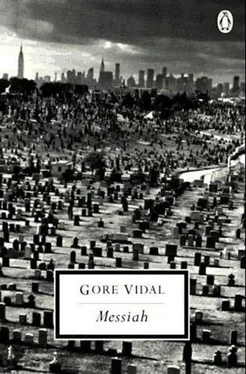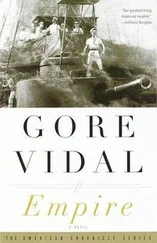Gore Vidal - Messiah
Здесь есть возможность читать онлайн «Gore Vidal - Messiah» весь текст электронной книги совершенно бесплатно (целиком полную версию без сокращений). В некоторых случаях можно слушать аудио, скачать через торрент в формате fb2 и присутствует краткое содержание. Жанр: Современная проза, на английском языке. Описание произведения, (предисловие) а так же отзывы посетителей доступны на портале библиотеки ЛибКат.
- Название:Messiah
- Автор:
- Жанр:
- Год:неизвестен
- ISBN:нет данных
- Рейтинг книги:3 / 5. Голосов: 1
-
Избранное:Добавить в избранное
- Отзывы:
-
Ваша оценка:
- 60
- 1
- 2
- 3
- 4
- 5
Messiah: краткое содержание, описание и аннотация
Предлагаем к чтению аннотацию, описание, краткое содержание или предисловие (зависит от того, что написал сам автор книги «Messiah»). Если вы не нашли необходимую информацию о книге — напишите в комментариях, мы постараемся отыскать её.
Messiah — читать онлайн бесплатно полную книгу (весь текст) целиком
Ниже представлен текст книги, разбитый по страницам. Система сохранения места последней прочитанной страницы, позволяет с удобством читать онлайн бесплатно книгу «Messiah», без необходимости каждый раз заново искать на чём Вы остановились. Поставьте закладку, и сможете в любой момент перейти на страницу, на которой закончили чтение.
Интервал:
Закладка:
"I haven't been East you know," he frowned at the palm trees. "I was born up in Washington state and I've spent all my life in the Northwest, until last year." He paused as though he expected me to ask him about that year. I did not. I waited for him to do it in his own way. He suddenly turned about in his chair and faced me; those disconcerting eyes suddenly trained upon my own. "You were there the other night, weren't you?"
"Why, yes."
"Did you feel it too? Am I right?"
The quick passion with which he said this, exploding all at once the afternoon's serenity, took me off guard. I stammered, "I don't think I know what you mean. I…"
"You know exactly what I mean, what I meant." He leaned closer to me and I wondered insanely if his deck chair might not collapse under him. It teetered dangerously. My mind went blank, absorbed by the image of deck chair and prophet together collapsing at my feet. Then, as suddenly, satisfied perhaps with my confusion, he settled back, resumed his earlier ease, exactly as if I had answered him, as though we had come to a crisis and together fashioned an agreement: it was most alarming.
"I want to see New York especially. I've always thought it must look like a cemetery with all those tall gray buildings you see in photographs." He sighed conventionally: "So many interesting places in the world. Do you like the West?" Nervously, I said that I did. I still feared a possible repetition of that brief outburst.
"I like the openness," said Cave, as though he had thought long about this problem. "I don't think I'd like confinement. I couldn't live in Seattle because of those fogs they used to have; San Francisco's the same. I don't like too many walls, too much fog." If he'd intended to speak allegorically he could not have found a better audience for I was, even at this early stage, completely receptive to the most obscure histrionics but, in conversation, Cave was perfectly literal. Except when he spoke before a large group, he was quite simple and prosaic and, though conscious always of his dignity and singular destiny, not in the least portentous.
I probably did not put him at his ease for I stammered a good deal and made no sense, but he was gracious, supporting me with his own poise and equanimity.
He talked mostly of places until Iris came back with tea. Then, as the sky became florid with evening and the teacups gradually grew cold, he talked of his work and I listened intently.
"I can talk to you straight," he said. "This just happened to me. I didn't start out to do this. No sir, I never would have believed ten years ago that I'd be traveling about, talking to people like one of those crackpot fanatics you've got so many in California." I took a sip of the black, fast-cooling tea, hoping he was not sufficiently intuitive to guess that I had originally put him down, provisionally of course, as precisely that.
"I don't know how much Iris may have told you or how much you might have heard but it's pretty easy to pass the whole thing off as another joke: a guy coming out of the backwoods with a message." He cracked his knuckles hard and I winced at the sound. "Well, I didn't quite come out of the woods. I had a year back at State University and I had a pretty good job in my field with the best firm of funeral directors in Washington state. Then I started on this. I just knew one day and so I began to talk to people and they knew too and I quit my job and started talking to bigger and bigger crowds all along the coast. There wasn't any of this revelation stuff. I just knew one day, that was all; and when I told other people what I knew they seemed to get it. And that's the strange part. Everybody gets ideas about things which he thinks are wonderful but usually nothing happens to the people he tries to tell them to. With me, it's been different from the beginning. People have all listened, and agreed: what I know they know. Isn't that a funny thing? Though most of them probably would never have thought it out until they heard me and it was all clear." His eyes dropped to his hands; he added softly: "So since it's been like this, I've gone on. I've made this my life. This is it. I shall come to the people."
There was silence. The sentence had been spoken which I was later to construct the first dialogue upon: "I shall come to the people," the six words which were to change our lives were spoken softly over tea.
Iris looked at me challengingly over Cave's bowed head. I remember little else about that evening. We dined, I think, in the house and Cave was most agreeable, most undemanding. There was no more talk of the mission. He asked me many questions about New York, about Harvard where I had gone to school, about Roman history. He appeared to be interested in paganism and my own somewhat ambiguous approach to Julian. I was to learn later that though he seldom read he had a startling memory for any fact which seemed relevant. I am neither immodest nor inaccurate when I say that he listened to me attentively for some years and many of his later views were a result of our conversations.
I should mention, though, one significant omission in his conversation during those first crucial years: he never discussed ethical questions; that was to come much later. At the beginning he had but one vision and it was, in its terrible truth, quite inhuman and anarchic: man dies, consciousness dies with him: it is good to die, good not to be. On this the Cavite system was constructed and what came after in the moral and ethical spheres was largely the work of others in his name. Much of this I anticipated in that first conversation with him, so unlike, actually, the dialogue which I composed ending, I still think complacently despite the irony with which time has tarnished all those bright toys for me, with the essential line: "Death is neither hard nor bad; only the dying hurts." With that firmly postulated the rest was inevitable.
Cave talked that evening about California and Oregon and Washington (geography, places were always to fascinate and engage him while people, especially after the early years, ceased to be remarkable to him; he tended to get confused those myriad faces which passed before him like successive ripples in a huge sea). He talked of the cities he had visited on the seaboard, new cities to him, all of them. He compared their climates and various attractions like a truly devoted tourist, eager to get the best of each place, to encounter the genius loci and possess it.
"But I don't like staying in any place long." He looked at me then and again I felt that sense of a power being focused on me… it was not unlike what one experiences during an X-ray treatment when the humming noise indicates that potent rays are penetrating one's tissue and, though there is actually no sensation, something is experienced, power is felt. And so it invariably was that, right until the end, Cave, whenever he chose, could turn those wide bleak eyes upon me and I would experience his force anew.
"I want to keep moving, new places, that's what I like. You get a kind of charge traveling. At least I do. I always thought I'd travel but I never figured it would be like this; but then of course I never thought of all this until just awhile ago."
"Can you remember when it was? how it was exactly you got… started?" I wanted a sign obviously: Constantine's labarum occurred to me: in hoc signo vinces . Already ambition was stirring, and the little beast fed ravenously on every scrap that came its way for I was, in that patio, experiencing my own revelation, the compass needle no longer spinning wildly but coming to settle at last, with many hesitancies and demurs, upon a direction, drawn to a far pole's attraction. He smiled for the first time. I suppose, if I wanted, I could recall each occasion over the years when, in my presence at least, John Cave smiled. His usual expression was one of calm resolve, of that authority which feels secure in itself, a fortunate expression which lent dignity even to his casual conversation: the fact that this serene mask hid a nearly total intellectual vacuity, I suspected as early in my dealings with him as this first meeting; yet I did not mind for I had experienced his unique magic and already I saw the possibilities of channeling that power, of using that force, of turning it like a flame here, there, creating and destroying, shaping and shattering… so much for the spontaneous nature of my ambition at its least responsible, and at its most exquisite! I could have set the one-half world aflame for the sheer splendor and glory of the deed. For this my expiation has been long and my once exuberant pride is now only an ashen phoenix consumed by flames but not yet tumbled to dust, not yet recreated in the millennial egg… only a gray shadow in the heart which the touch of a finger of windy fear will turn to air and dust.
Читать дальшеИнтервал:
Закладка:
Похожие книги на «Messiah»
Представляем Вашему вниманию похожие книги на «Messiah» списком для выбора. Мы отобрали схожую по названию и смыслу литературу в надежде предоставить читателям больше вариантов отыскать новые, интересные, ещё непрочитанные произведения.
Обсуждение, отзывы о книге «Messiah» и просто собственные мнения читателей. Оставьте ваши комментарии, напишите, что Вы думаете о произведении, его смысле или главных героях. Укажите что конкретно понравилось, а что нет, и почему Вы так считаете.












